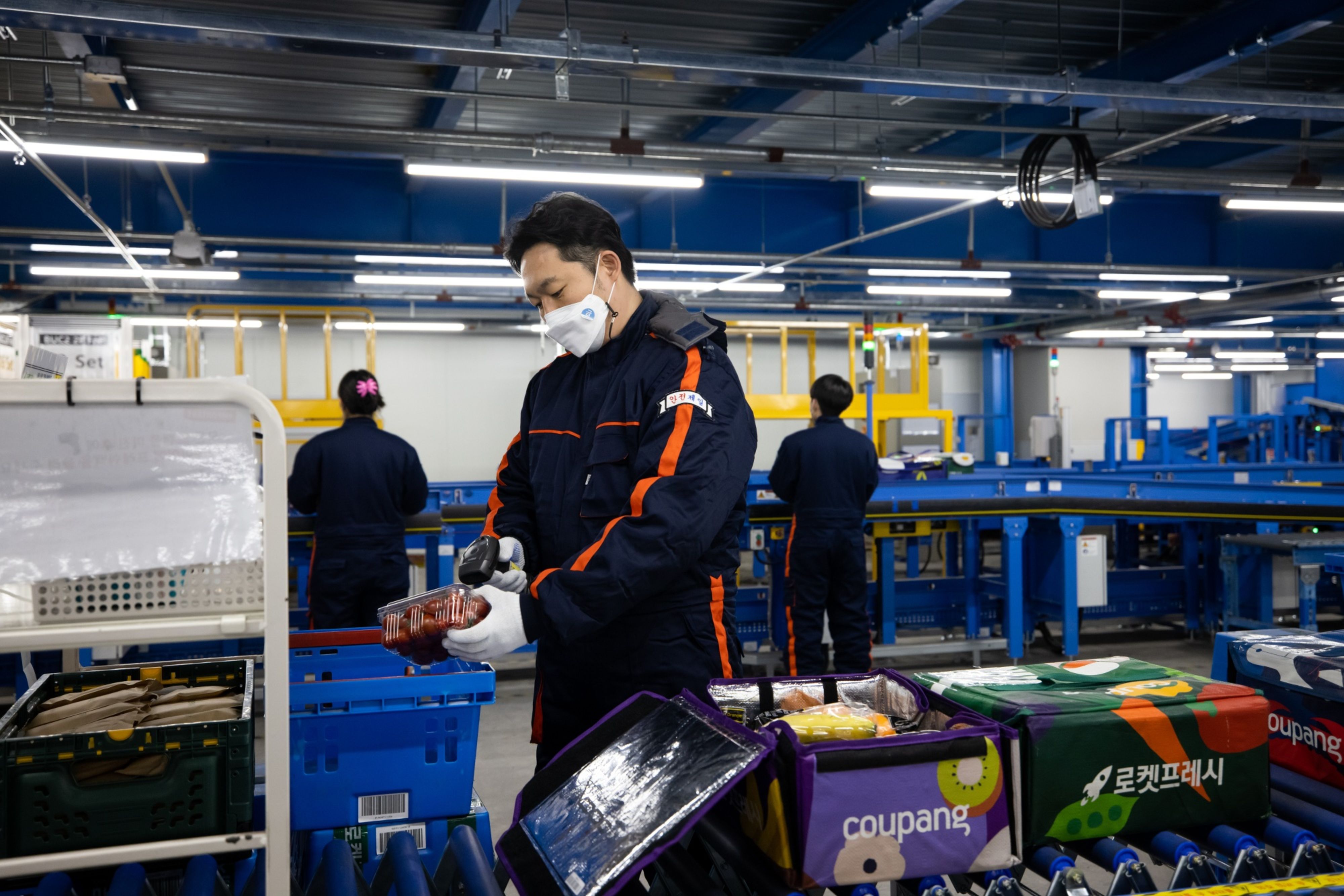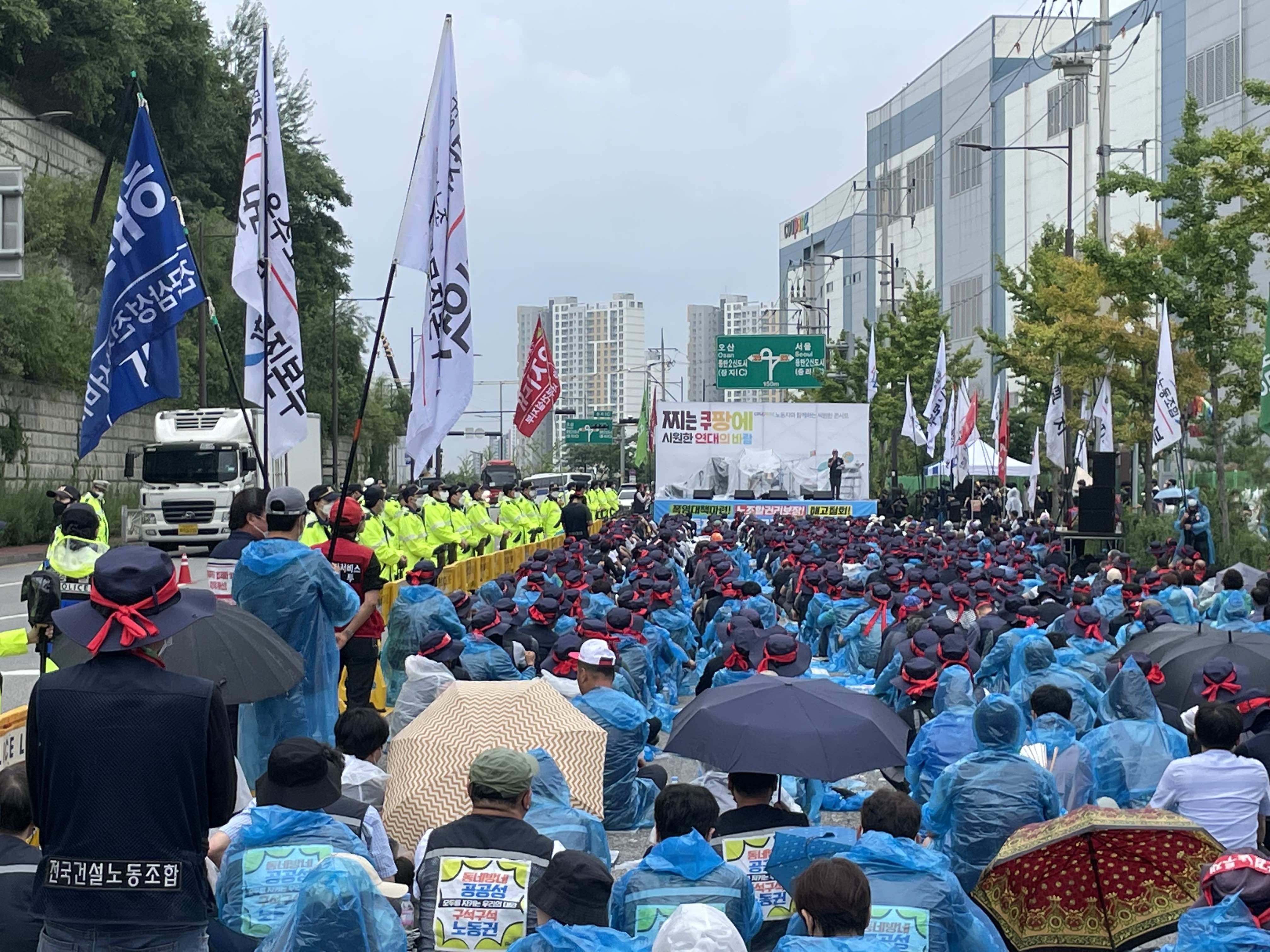
Hwaseong, South Korea – When Jeong Dong-heon returns home from work at a Coupang logistics centre, he often finds crusty white patterns on the back and sides of his shirt.
The flower-like shapes are created by accumulated salt deposits – a result of the sweat that pours off his body as he works at a massive warehouse run by one of South Korea’s largest companies.
Jeong works from 8am to 5pm, carrying out physical tasks that include lifting and carrying heavy boxes. This summer, South Korea has experienced record-setting temperatures and the heat has become so dizzying that Jeong often worries about collapsing.
“Working in the warehouse feels like being inside a boiling pot,” Jeong, 29, told Al Jazeera.
Jeong is among a group of workers organising for air conditioning to be considered not a luxury, but a basic necessity for them to do their jobs safely. He and his colleagues are seeking to remind the company, and customers, of the human sweat at the root of convenient, quick deliveries.

With heat waves now a routine occurrence in July and August, workers want Coupang to commit to binding solutions. Their demands: adequate air conditioning in all workspaces and a guaranteed 20 minutes of rest time for every two hours of work.
Coupang rose to become South Korea’s leading e-commerce firm with its speedy, inexpensive delivery of a near-infinite array of goods, from fresh fruit to lawn mowers and foot massagers.
Like its US rival Amazon, Coupang has faced allegations that its high-tech dominance is built on the exploitation of workers. At least two deaths have been reported at the centre where Jeong works, and labour groups claim that strenuous workplace conditions were factors. Last year, a government body linked the death of a 27-year-old man at another Coupang centre to his long hours working on the warehouse floor.
In all seasons, work at Coupang is physically taxing. An independent 2021 study found that 73 percent of workers reported their work to be more intense than fast walking. Half of the workers surveyed said that they “always” felt exhausted after their shift, with nearly 30 percent saying they “often” felt exhausted.
With more than 60,000 workers, Coupang is South Korea’s third-largest employer, behind Samsung Electronics and Hyundai Motor Company. When the company debuted on the New York Stock Exchange last year, it announced plans to hire 50,000 more employees in the country by 2025.
Yoon Soo-hyun, a 43-year-old worker at a Coupang centre in Goyang, a satellite city north of Seoul, said informal norms on the warehouse floor discourage workers from taking breaks.

“The company puts out a few chairs and tells us that if we’re tired, we can sit for a while,” Yoon told Al Jazeera. “But everyone feels nervous because there are always supervisors watching us, seeing who is on break and for how long.”
He added, “We don’t want to lose our jobs, so we just do what we’re told.”
Coupang says it meets government standards.
“We meet and/or exceed all health-related government regulations for the indoor and outdoor working areas of our fulfilment centers,” the company told Al Jazeera in a statement.
“If a worker has any health issue for any reason while working at one of our facilities, they are permitted to stop working.”
The company added that its workers are given breaks every four hours and extra rest periods during hot weather.
Though Coupang workers have organised in order to get air conditioning, some experts say that large spaces like warehouses present unique challenges that make it difficult to keep them cool.
Jung Jin-woo, a professor at Seoul National University of Science and Technology who studies occupational safety and health management, said expecting air conditioning in the warehouses is “unrealistic”.
“The centres have very high ceilings, they’re open 24 hours a day, and the space is more than 15 times larger than a football field,” Jung told Al Jazeera.

Meanwhile, Coupang told Al Jazeera it has installed 20,000 cooling units, including air conditioners and fans, in its logistics centres and provides air-conditioned break rooms on every floor. But workers say this doesn’t go far enough and the warehouses are still oppressively hot.
While Coupang has built up a huge customer base in recent years, the firm’s efforts to stay ahead in the fiercely competitive e-commerce sector, including major investments in automation, have resulted in steep losses.
The company recorded net losses of $405m in the last quarter of 2021 and another $209m in losses during the first quarter of this year. Since debuting on the New York Stock Exchange last year, Coupang has faced growing pressure from investors to turn a profit, analysts say.
The company’s near-term prospects are also complicated by the generally weak economic outlook in South Korea, a country currently beset by sluggish growth and high inflation.
“People have less to spend, so there will probably be a slowing of Coupang’s revenue growth,” Shin Se-don, a professor of economics at Sookmyung Women’s University in Seoul, told Al Jazeera.
Despite the challenges workers face, Coupang still offers jobs that are attractive to many South Koreans, especially those without the academic credentials traditionally required for white-collar positions.
Coupang said workers in its fulfilment centres can earn up to 3.42 million won ($2,652) per month, a competitive amount in a country with a minimum wage of 9,160 won ($7.03) per hour. The company also does not require specific education or experience credentials when hiring.

Jeong, who is wiry and energetic, has worked at Coupang since April of last year and says he is committed to remaining there for the foreseeable future. He is motivated not only by his own need to make a living, but a desire to improve the lot of a growing number of workers in a company that is fast becoming one of his country’s most recognisable corporate brands.
Last month, Jeong and other Coupang workers wheeled an air conditioner and marched 50km (32 miles) from the company’s headquarters in southeastern Seoul to the warehouse where he works.
At the end of the march, Jeong caught his breath in the shadow of the hulking building where he spends his days. He described the battle for air conditioning as a step towards longer-term goals, like higher wages and more say in company affairs.
“This will be a long struggle,” he said.





